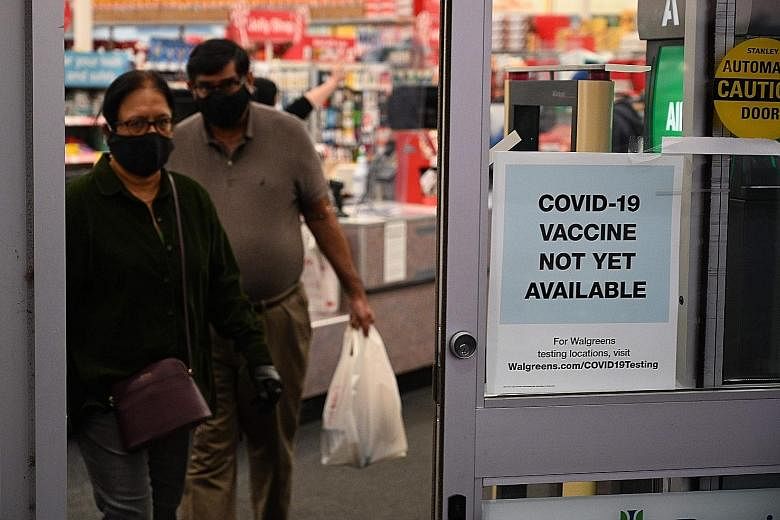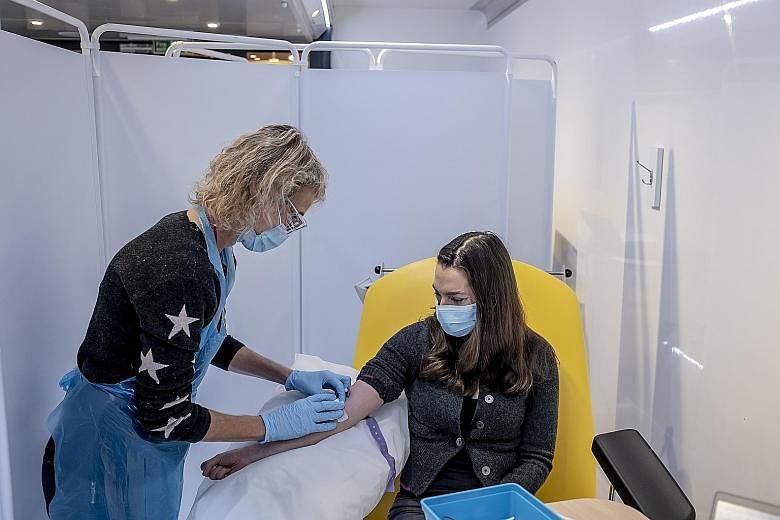LONDON • AstraZeneca's Covid-19 vaccine looks headed for an additional global trial as the drug-maker tries to clear up uncertainty and confusion surrounding favourable results in its current study.
The company wants the new test to confirm the 90 per cent efficacy rate that the shot showed in a portion of an existing trial, chief executive officer Pascal Soriot said. It is favouring that option rather than adding an arm to a separate study that's already under way in the United States.
Questions are mounting over one of the fastest-moving shots after the company acknowledged that a lower dosage level that appeared more effective resulted from a manufacturing discrepancy.
A day after the data was unveiled, the head of Operation Warp Speed, the US vaccine programme, said that the regimen showing the higher level of effectiveness was tested in a younger population.
He also said the half-dose was given to some people because of an error in the quantity of vaccine put into some vials. None of those details were disclosed in Astra or Oxford's original statements.
Dr Soriot disputed the idea that the half-dose regimen was an error, saying that after researchers realised the dosing discrepancy, they formally changed the trial protocol with the blessing of regulators. "I won't tell you we expected the efficacy to be higher," said Dr Soriot. But "people call it a mistake - it's not a mistake".
"Now that we've found what looks like a better efficacy, we have to validate this, so we need to do an additional study," Dr Soriot said in his first interview since the data was released. He said he didn't expect the additional trial to hold up regulatory approvals in the UK and European Union.
Britain's Health Secretary Matt Hancock yesterday asked the nation's medical regulator to potentially bypass its EU counterpart and approve the supply of AstraZeneca's vaccine to speed its deployment. Until the end of the year, when the UK exits a post-Brexit transition period, vaccines must be authorised by the European Medicines Agency.
But Mr Hancock said he invoked a special rule allowing Britain's regulator to authorise a temporary supply of the vaccine if the data is robust enough.
By speeding up the regulatory approval process, the UK hopes to be able to begin its mass vaccination programme next month. The government has purchased 100 million doses of the shot in advance, and estimates that four million of them will be available by year-end.
Clearance from the US Food and Drug Administration may take longer because the regulator is unlikely to approve the vaccine on the basis of studies conducted elsewhere, especially given the questions over the results, Dr Soriot said. Authorisation in some countries is still expected before the end of the year, he said.
There's added pressure on the Astra shot to succeed as it's easier to store and the firm is selling it at cost during the pandemic, which means many low-and middle-income countries are relying on it.
Developers of the Sputnik V Covid-19 vaccine said on Thursday that AstraZeneca should try combining its experimental shot with the Russian one to boost efficacy.
"If they go for a new clinical trial, we suggest trying a regimen of combining the AZ shot with the #SputnikV human adenoviral vector shot to boost efficacy," the developers of the Russian vaccine said on their Twitter account.
"Combining vaccines may prove important for revaccinations."
US President Donald Trump said on Thursday that delivery of the coronavirus vaccine would begin next week and the week after.
Speaking to US troops overseas via video link to mark the Thanksgiving holiday, Mr Trump said the vaccine would initially be sent to front-line workers, medical personnel and senior citizens.
Meanwhile, suspected North Korean hackers have tried to break into the systems of AstraZeneca in recent weeks, two people with knowledge of the matter said.
The hacking attempts targeted a "broad set of people", including staff working on Covid-19 research, said one of the sources, but are not thought to have been successful.
BLOOMBERG, REUTERS
SEE INSIGHT • A30-33












